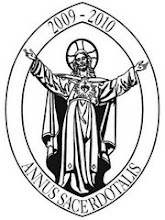 From Diocese of Westminster website:Frs Kingsley and Houghton ordained last year.
From Diocese of Westminster website:Frs Kingsley and Houghton ordained last year.Fr. Finigan has another thought provoking post, the title of which is :
The importance of a "culture of vocation"
Fr. has some interesting statistics from a survey produced for the US Bishops by the Centre for Applied Research in the Apostolate (CARA) at Georgetown University.- Almost 45% of Catholic priests planning to be ordained this year, said that they had been discouraged from considering the priesthood
- of those, nearly 6 in 10 said a parent or family member was the source of the discouragement
- 51% said a friend or classmate had counselled them against the priesthood, and
- 15% said a priest or other clergy had
The word 'vocation' itself is based on the latin word 'vocare' meaning 'to call'. And 'to call' usually involves using words and/or actions. It is a way of communicating a message.
Suitable conditions in which to communicate the message are needed, hence a culture is required.
The Culture of Vocation (to the priesthood , religious life, or marriage) begins at home, in the family. It is within the family that children will learn most about the marriage vocation, and from their own parents. Here parents have the dual responsibility of living out their marriage vows faithfully; not only towards each other, but additionally in the presence of their children, who are learning 'how to live marriage' directly from the words and actions and being of their parents.
A child's first experience of the Church is the domestic church; his parents will lead the child into the presence of God through a regular and frequent prayer life at home. The place of prayer in the home is of the greatest importance: children who witness their parents praying, and pray with them, will see that their parents attach the highest value to spending time with God, and will be encouraged to do the same.
The provision of good quality Catholic books, articles, signs of God's presence e.g. crucifixes/holy pictures, orthodox Catholic media (including blogs!) and the introduction, over time, of the Teachings of the Church, its structure and its hierarchy, supports the child's faith alongside, but not instead of, prayer. The work of priests and religious in the Church, past and present, will naturally be part of this. Its important to use opportunities for children to get to meet and know priests and religious; to use Fr. Finigan's phrase, it helps to 'normalise' the idea of a priestly or religious vocation.
We have found the Youth 2000 Retreats a valuable means of achieving this, in addition to the great catechesis which Y2k provides. And, as Fr. John Edwards said some years ago,
'There must be something very special about a 'Youth Movement' which in post-Christian Britain has in less than ten years produced 35 religious vocations, 12 vocations to lay communities and 15 marriages.'
Above all, a Culture of Vocation needs to be prayed for; that hearts and minds of young people, their families, friends, parishes and priests will be open to God's will.
Pray with us for more labourers to the harvest.
O almighty and eternal God who did send Thy Divine Son into this world to give His life for the souls of men, we beg thee send more labourers to the harvest. Grant us the priceless blessing of good Catholic homes; homes which shall be sanctuaries of prayer, fortresses against evil and nurseries of vocations. May the parents of such homes long and pray for the high honour of offering one or more of their children to Thy service and wherever Thy call comes, may it find a ready and generous response in the hearts of the children of such homes. That like the first disciples, they may gladly leave all things to follow Thy Divine Son our Lord Jesus Christ, who lives and reigns with Thee forever.
Amen.
One of our sons is seriously considering a vocation to the priesthood: he is a member of Fr. Stephen Langridge's Quo Vadis group and has been blessed to be under the guidance of such a gifted,dynamic and exemplary priest.




No comments:
Post a Comment